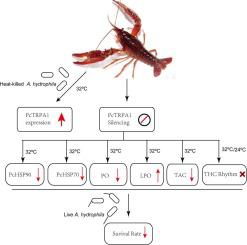Comparative Biochemistry and Physiology B: Biochemistry & Molecular Biology ( IF 2.2 ) Pub Date : 2021-08-06 , DOI: 10.1016/j.cbpb.2021.110654 Bo Liu 1 , Xiaojun Song 1 , Suhua Bai 2 , Chaohua Dong 2

|
Temperature is an important environmental factor influencing immune responses of crayfish. However, the mechanism underlying how temperature affects immune responses remains unclear. Here, we identified an ortholog of the transient receptor potential ankyrin subtype 1 (TRPA1), a temperature sensor of Drosophila, from Procambarus clarkii (PcTRPA1-1). Its expression was induced by high temperature and challenge with heat-killed A. hydrophila at high temperature, but not at lower temperature. PcTRPA1-1 silencing led to increased mortality of crayfish challenged with live A. hydrophila at high temperature (32 °C), but had no statistically significant effect on crayfish mortality at 24 °C. This suggests that PcTRPA1-1 is involved in the immune responses of crayfish at high temperature as a potential temperature sensor. Further assay exhibited that PcTRPA1-1 silencing affected immune responses of crayfish, including increase of lipid peroxidation, reduction of total antioxidant capacity, decreased phenoloxidase activity and disruption of circadian rhythm of total hemocyte count entrained by temperature cycles. PcTRPA1-1 silencing also decreased the expression of PcHSP70 and PcHSP90 which are responsive to heat stimuli and bacterial challenge. The results collectively indicate that TRPA1 contributes to heat sensing of crayfish and is required for crayfish defense against bacterial infection.
中文翻译:

小龙虾 (Procambarus clarkii) TRPA1 是在高温条件下防御嗜水气单胞菌感染所必需的,并有助于热感应
温度是影响小龙虾免疫反应的重要环境因素。然而,温度如何影响免疫反应的机制仍不清楚。在这里,我们鉴定了来自Procambarus clarkii (PcTRPA1-1)的瞬时受体电位锚蛋白亚型 1 (TRPA1) 的直系同源物,它是果蝇的温度传感器。它的表达是由高温诱导的,并在高温下用热灭活的A. hydrophila攻击,但在较低温度下则没有。PcTRPA1-1沉默导致受活 A.hydrophila 攻击的小龙虾死亡率增加在高温(32°C)下,但在 24°C 对小龙虾死亡率没有统计学意义的影响。这表明PcTRPA1-1作为潜在的温度传感器参与了小龙虾在高温下的免疫反应。进一步的分析表明,PcTRPA1-1沉默影响小龙虾的免疫反应,包括脂质过氧化增加、总抗氧化能力降低、酚氧化酶活性降低以及温度循环导致的总血细胞计数昼夜节律中断。PcTRPA1-1沉默也降低了PcHSP70和PcHSP90的表达它们对热刺激和细菌挑战有反应。结果共同表明TRPA1有助于小龙虾的热感应,并且是小龙虾防御细菌感染所必需的。


























 京公网安备 11010802027423号
京公网安备 11010802027423号